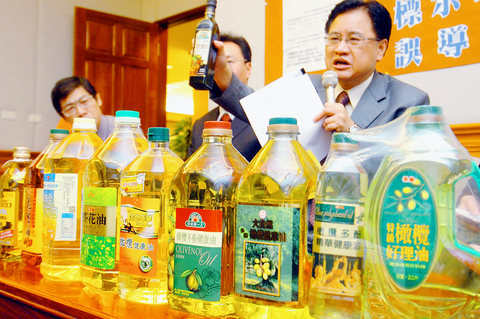Taiwan Solidarity Union legislators Tsenng Tsan-teng (
According to the two legislators, certain types of products labeled "olive oil" and produced by Uni-President, Fwu-sow, Taisan Enterprise and Great Day are actually blended with cheaper oils.
The legislators claim that oils labeled as "olive oil" produced by these companies are up to 90 percent mustard seed oil or sun flower oil, but are sold at a higher price because of the better reputation of olive oil. They also claim that the presence of oils other than olive oil are not noted on the labels, thereby misleading the public in violation of Article 19 of the Regulation of Health Food (食品衛生管理法).

PHOTO: CHANG CHIA-MING, TAIPEI TIMES
Olive oil contains between 71 percent and 79 percent unsaturated fatty acid, the highest percentage of any edible oil. It is this which gives olive oil its much vaunted medicinal benefits, including reducing the danger of heart disease and cancer.
According to Tsenng and Huang, a study has indicated that two-liter bottles of olive oil produced by Uni-President, Fwu-sow, Taisan and Great Day contained only 200ml of pure olive oil.
Tsenng said that pure olive oil sells for between NT$28.50 and NT$35.80 per 100ml, depending on quality, as opposed to NT$3.83 to NT$4.30 for mustard seed and sunflower oil.
They also pointed out that the same situation existed with peanut oil, which they said was often mixed with soybean oil, sesame oil or other vegetable oils to reduce cost.
Representatives of the manufactures refuted the accusations, according to Chinese-language media reports, saying that both pure and blended oils were available on the market, and with the exception of oils which were clearly labeled as 100 percent or pure olive oil, most others were blends of one kind or another.
According to Huang Yu-ting (
She said that the addition of other vegetable oils could in fact improve the healthy qualities of such oils, but that such mixtures would always be displayed on the label.

Taiwan is to commence mass production of the Tien Kung (天弓, “Sky Bow”) III, IV and V missiles by the second quarter of this year if the legislature approves the government’s NT$1.25 trillion (US$39.78 billion) special defense budget, an official said yesterday. Commenting on condition of anonymity, a defense official with knowledge of the matter said that the advanced systems are expected to provide crucial capabilities against ballistic and cruise missiles for the proposed “T-Dome,” an advanced, multi-layered air defense network. The Tien Kung III is an air defense missile with a maximum interception altitude of 35km. The Tien Kung IV and V

The disruption of 941 flights in and out of Taiwan due to China’s large-scale military exercises was no accident, but rather the result of a “quasi-blockade” used to simulate creating the air and sea routes needed for an amphibious landing, a military expert said. The disruptions occurred on Tuesday and lasted about 10 hours as China conducted live-fire drills in the Taiwan Strait. The Civil Aviation Administration (CAA) said the exercises affected 857 international flights and 84 domestic flights, affecting more than 100,000 travelers. Su Tzu-yun (蘇紫雲), a research fellow at the government-sponsored Institute for National Defense and Security Research, said the air

A strong continental cold air mass is to bring pollutants to Taiwan from tomorrow, the Ministry of Environment said today, as it issued an “orange” air quality alert for most of the country. All of Taiwan except for Hualien and Taitung counties is to be under an “orange” air quality alert tomorrow, indicating air quality that is unhealthy for sensitive groups. In China, areas from Shandong to Shanghai have been enveloped in haze since Saturday, the ministry said in a news release. Yesterday, hourly concentrations of PM2.5 in these areas ranged from 65 to 160 micrograms per cubic meter (mg/m³), and pollutants were

Taiwan’s armed forces have established response protocols for a wide range of sudden contingencies, including the “Wan Chun Plan” to protect the head of state, the Ministry of Defense (MND) said today. After US President Donald Trump on Saturday launched a series of airstrikes in Venezuela and kidnapped Venezuelan President Nicolas Maduro, concerns have been raised as to whether China would launch a similar “decapitation strike” on Taiwan. The armed forces regularly coordinate with relevant agencies and practice drills to ensure preparedness for a wide range of scenarios, Vice Minister of National Defense Hsu Szu-chien (徐斯儉) told reporters before a